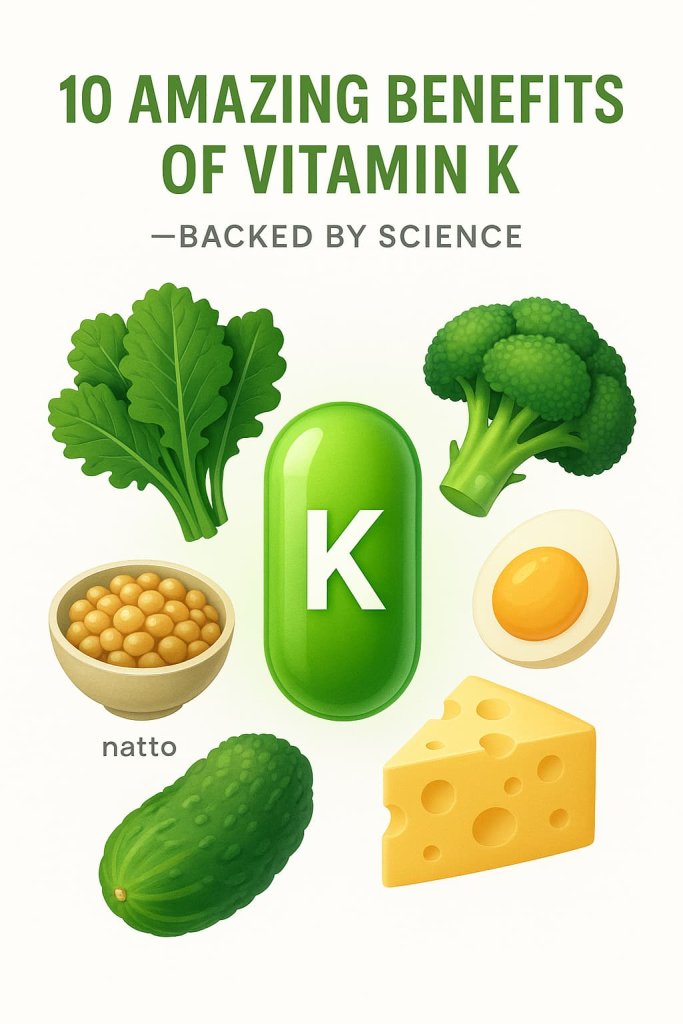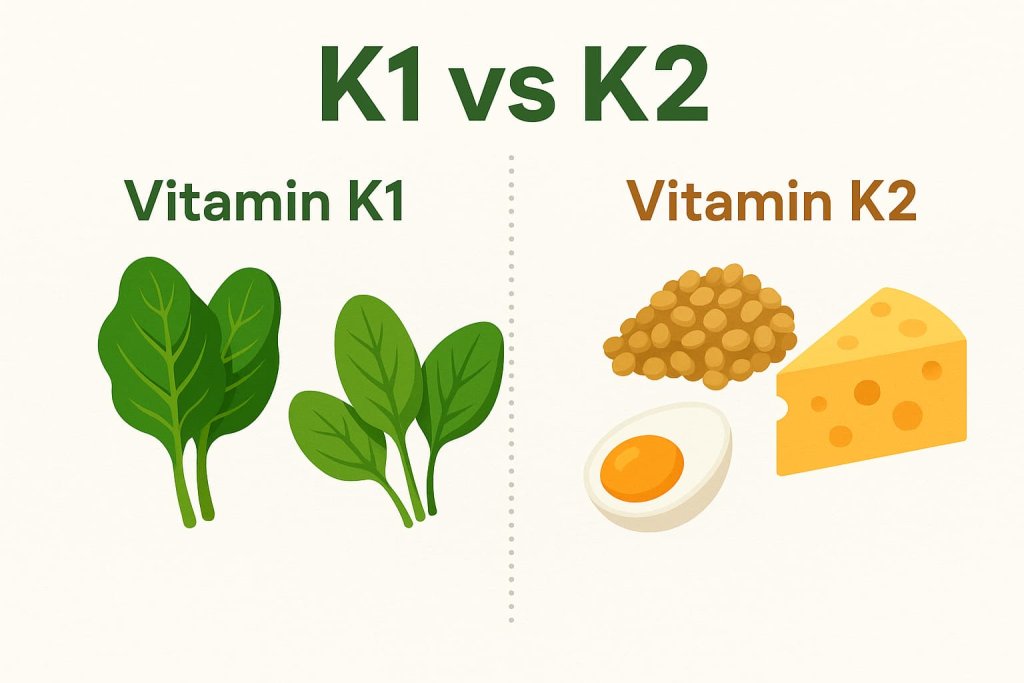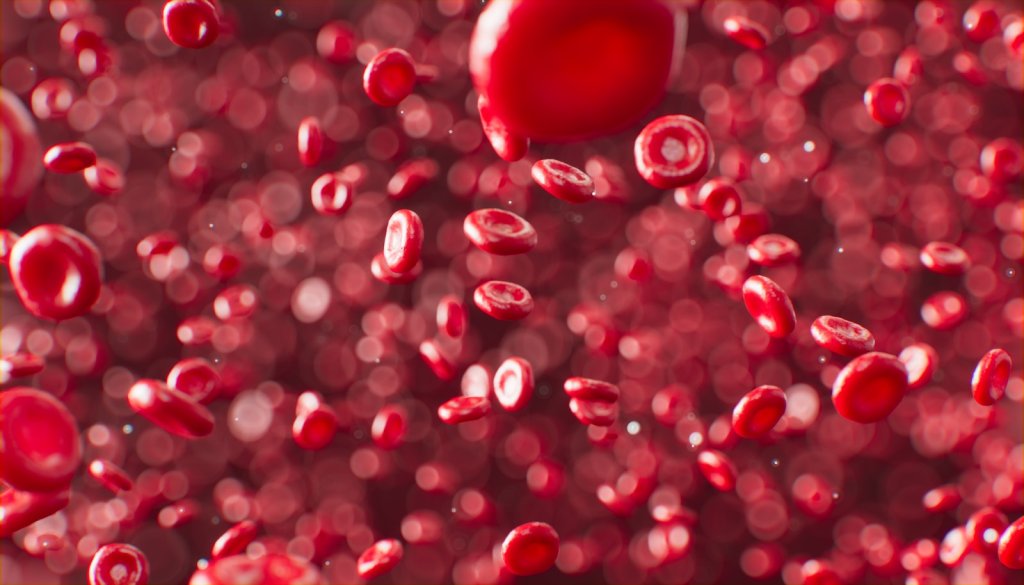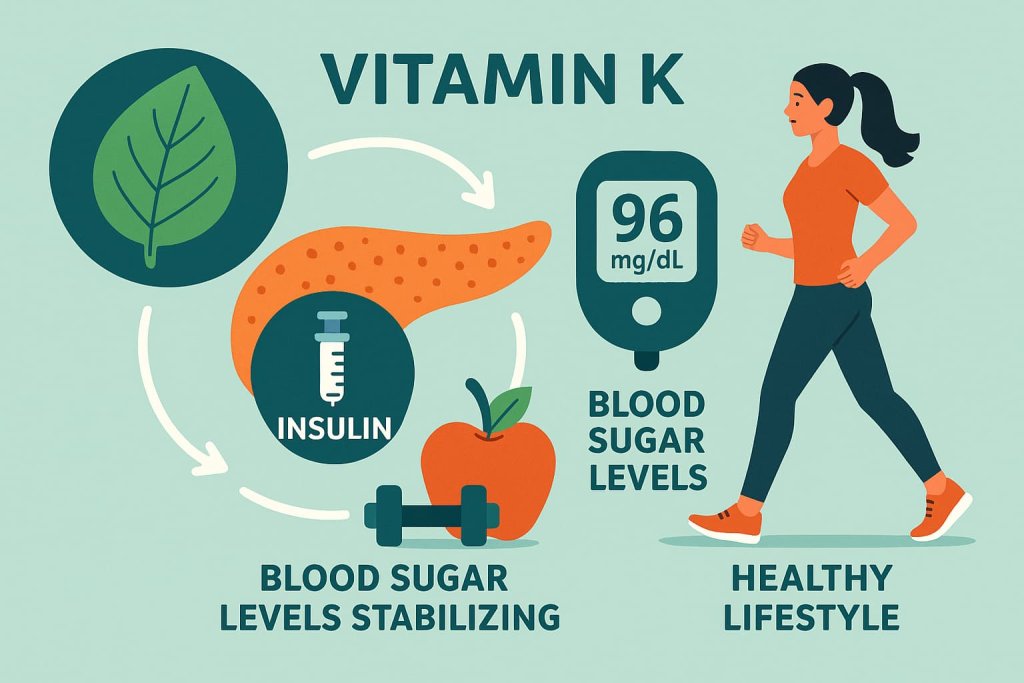Vitamin K plays a vital role in blood clotting, bone strength, and heart health. It’s one of the most overlooked yet essential nutrients your body needs daily. Beyond preventing bleeding, new research shows that vitamin K—especially vitamin K2—supports your brain, heart, and metabolism.

Understanding its science-backed benefits helps you choose the right foods and supplements for long-term health. This article explores 10 evidence-based benefits of vitamin K, along with current research and practical tips for optimal intake.
What Is Vitamin K (K1 vs K2)?

Vitamin K is a fat-soluble family of compounds that activate vitamin-K–dependent proteins (VKDPs) essential for blood clotting, calcium balance, and bone and cardiovascular health.
There are two primary forms: Vitamin K1 (phylloquinone) and Vitamin K2 (menaquinones), and though they share similar structures, their functions, food sources, and absorption differ significantly.
Vitamin K1 (Phylloquinone)
- Primary sources: Green leafy vegetables such as kale, spinach, collard greens, broccoli, Brussels sprouts, parsley, and plant oils like soybean and canola oil.
- Main role: Supports blood coagulation by activating clotting factors II, VII, IX, and X in the liver.
- Absorption & half-life: Absorbed with dietary fat and has a shorter half-life, mostly used in the liver.
- Unique fact: According to the NIH Office of Dietary Supplements (2024), vitamin K1 accounts for about 90% of total vitamin K intake in most diets.
👉 Reference: NIH Office of Dietary Supplements – Vitamin K Fact Sheet
Vitamin K2 (Menaquinones: MK-4, MK-7, etc.)
- Primary sources: Natto (fermented soybeans, the richest known source), cheese, yogurt, egg yolks, liver, and other animal products. Some K2 is also produced by beneficial gut bacteria.
- Main role: Activates osteocalcin (for bone mineralization) and Matrix Gla Protein (MGP) (for preventing arterial calcification).
- Absorption & half-life: Fat-dependent, but many forms (especially MK-7) have a longer half-life and circulate longer than K1, allowing better use by bones and blood vessels.
- Synergy: Works synergistically with vitamin D3, ensuring that calcium is deposited in bones rather than arteries.
👉 References: Harvard Health Publishing – Vitamin K Benefits
Quick Comparison: K1 vs K2
| Feature | Vitamin K1 (Phylloquinone) | Vitamin K2 (Menaquinones: MK-4, MK-7) |
|---|---|---|
| Common Foods | Kale, spinach, broccoli, parsley, plant oils | Natto, aged cheeses, egg yolks, liver, fermented foods |
| Primary Role | Blood clotting (liver-based proteins) | Bone & heart health (extra-hepatic proteins) |
| Half-Life | Short (hours) | Long (days, especially MK-7) |
| Distribution | Mostly in the liver | Reaches bones, arteries, and soft tissues |
| Synergy | Works alone for clotting | Works with Vitamin D and A for calcium control |
| Deficiency Risk | Rare, but possible with fat malabsorption | More common in Western diets (low fermented foods) |
How They Work Differently
Both K1 and K2 activate special proteins through a process called γ-carboxylation, which lets those proteins bind calcium properly.
- Vitamin K1 mostly helps your liver make clotting factors that stop bleeding.
- Vitamin K2 helps guide calcium into your bones and teeth, while keeping it out of arteries and soft tissues — protecting against calcification and heart disease.
Practical Tips
- Always consume vitamin K–rich foods with healthy fats (olive oil, avocado, eggs) for better absorption.
- If you take anticoagulant drugs like warfarin, do not drastically change your vitamin K intake — keep it steady and follow your doctor’s guidance.
- Combine vitamin K2 with vitamin D3 for optimal bone and cardiovascular benefits.
Science-Backed Health Benefits of Vitamin K
1. Supports Normal Blood Clotting

Vitamin K is essential for proper blood clotting — it helps your body stop bleeding when you get injured.
This vitamin activates specific proteins called clotting factors (II, VII, IX, and X) in the liver. These factors work together to form fibrin, a mesh that seals wounds and prevents excessive blood loss.
Without enough vitamin K, your blood cannot clot properly, which may cause:
- Frequent nosebleeds or bleeding gums
- Easy bruising from minor bumps
- Prolonged bleeding even from small cuts
Vitamin K deficiency is rare in adults but can occur in people taking blood-thinning medications (e.g., warfarin), which interfere with the vitamin K cycle. In such cases, maintaining consistent intake—through leafy greens and balanced supplementation—is vital.
💡 According to the NIH Office of Dietary Supplements (2024), vitamin K is a key cofactor for gamma-glutamyl carboxylase, the enzyme that activates clotting proteins.
👉 Source: NIH ODS, 2024
2. Strengthens Bones and Prevents Fractures

Vitamin K2 plays a crucial role in building strong bones and reducing fracture risk. It activates a protein called osteocalcin, which binds calcium to the bone matrix, keeping bones dense and resilient.
- A 2024 meta-analysis in Frontiers in Women’s Health found that postmenopausal women taking K2 supplements had significantly higher bone mineral density and a reduced risk of spinal fractures compared to those who didn’t.
- Vitamin K works synergistically with vitamin D, ensuring calcium is absorbed properly and directed into bones instead of soft tissues.
People with low vitamin K levels are at a greater risk of osteoporosis, particularly as they age. Regular intake of K2-rich foods (like natto, hard cheese, and egg yolk) helps support long-term skeletal health.
👉 Source: Frontiers in Women’s Health, 2025
3. Protects the Heart by Reducing Arterial Calcification

Vitamin K helps keep your arteries flexible and your heart strong.
It activates Matrix Gla Protein (MGP) — a calcium-binding compound that prevents calcium from being deposited in the arteries.
When vitamin K is low, arterial calcification can occur, causing blood vessels to harden — a major risk factor for heart attacks and strokes.
- A long-term review from Harvard Health (2025) showed that people with higher K2 intake had less arterial stiffness and a lower risk of coronary heart disease.
- Vitamin K2 (especially MK-7) is more effective than K1 in maintaining vascular elasticity.
This means that getting enough vitamin K2 not only strengthens your bones but also protects your heart by keeping calcium where it belongs — in your skeleton, not your arteries.
👉 Source: Harvard Health, 2025
4. Improves Brain Function and Memory

Vitamin K contributes to brain health, memory, and cognitive resilience.
It supports the metabolism of sphingolipids, specialized fats that maintain the structure and function of brain cell membranes.
- In 2025, Tufts University researchers found that a low-vitamin K diet in mice led to memory impairment, reduced neurogenesis, and increased inflammation in the hippocampus (the brain’s memory center).
- Vitamin K also plays a role in producing anti-inflammatory proteins that protect brain tissue from oxidative stress.
Emerging research suggests that maintaining adequate vitamin K intake—especially through diet—may lower the risk of age-related cognitive decline and support long-term mental clarity.
👉 Source: Tufts University News, April 2025
5. May Lower Risk of Type 2 Diabetes

Vitamin K helps regulate blood sugar levels and insulin sensitivity.
Researchers have discovered that vitamin K influences the function of pancreatic β-cells, which produce insulin.
- People with higher dietary or supplemental vitamin K2 intake tend to have better glucose metabolism and a lower risk of developing type 2 diabetes.
- Vitamin K’s anti-inflammatory and antioxidant effects reduce oxidative stress in insulin-producing cells, improving their performance.
While more human trials are needed, several reviews suggest that vitamin K could play a supporting role in metabolic health and insulin balance.
6. Supports Healthy Skin and Wound Healing

Vitamin K contributes to faster wound healing and clearer, healthier skin.
It enhances blood coagulation and supports collagen synthesis, which helps the skin repair itself after injuries, bruises, or surgeries.
- Dermatologists often recommend vitamin K creams after procedures like laser therapy or injections to reduce redness, swelling, and bruising.
- A deficiency can delay wound recovery, cause under-eye dark circles, or lead to fragile skin that bruises easily.
Eating foods rich in vitamin K and maintaining adequate intake supports skin elasticity and helps the body’s natural repair mechanisms.
7. May Reduce Cancer Progression (Emerging Research)
Early research indicates that vitamin K2 may help slow the growth of certain cancer cells.
- Laboratory studies show that menaquinones (vitamin K2 compounds) can inhibit tumor angiogenesis—the process by which cancer cells form new blood vessels to spread.
- K2 may also trigger apoptosis (programmed cell death) in cancerous tissues, particularly in liver and prostate cancers.
While these findings are promising, scientists emphasize that more clinical human trials are needed before recommending vitamin K2 for cancer prevention or treatment.
8. Enhances Longevity and Healthy Aging

Vitamin K supports multiple systems that keep you healthier as you age.
It’s involved in bone strength, cardiovascular protection, and brain function, all of which decline with age.
- Observational studies link higher vitamin K intake to lower all-cause mortality, especially from cardiovascular and metabolic causes.
- Its anti-inflammatory, antioxidant, and calcium-regulating effects contribute to slower aging and improved quality of life.
By keeping calcium in balance and protecting key organs, vitamin K acts as a longevity nutrient that promotes graceful aging.
9. Supports Immune System and Inflammation Control
Vitamin K helps maintain immune balance and controls chronic inflammation.
It modulates the NF-κB pathway, a key regulator of inflammatory responses.
- Low vitamin K levels are associated with increased markers of inflammation such as C-reactive protein (CRP).
- Vitamin K2 supplementation (particularly MK-7) may help optimize cytokine responses and support recovery from infections or inflammation-related fatigue.
This anti-inflammatory role makes vitamin K particularly beneficial for people with arthritis, autoimmune disorders, or metabolic inflammation.
10. Supports Oral and Dental Health

Vitamin K2 is crucial for strong teeth and gums.
It activates osteocalcin and Matrix Gla Protein (MGP), which move calcium into teeth and bones while preventing deposits in soft tissues.
This process helps strengthen enamel and jawbone density, reducing cavities and gum disease risk.
K2 also works synergistically with vitamins A and D to promote remineralization and long-term oral health.
How Much Vitamin K Do You Need Daily?
Your daily vitamin K requirement depends on age, sex, and life stage, and is usually measured in micrograms (mcg).
According to the National Institutes of Health (NIH Office of Dietary Supplements, 2024), the following are the recommended daily intakes (Adequate Intakes – AIs) for vitamin K:
NIH Recommended Daily Intakes of Vitamin K
| Age Group | Recommended Intake (mcg/day) | Source |
|---|---|---|
| Infants (0–6 months) | 2.0 mcg | NIH ODS |
| Infants (7–12 months) | 2.5 mcg | NIH ODS |
| Children (1–3 years) | 30 mcg | NIH ODS |
| Children (4–8 years) | 55 mcg | NIH ODS |
| Boys (9–13 years) | 60 mcg | NIH ODS |
| Girls (9–13 years) | 60 mcg | NIH ODS |
| Teen Boys (14–18 years) | 75 mcg | NIH ODS |
| Teen Girls (14–18 years) | 75 mcg | NIH ODS |
| Men (19+ years) | 120 mcg | NIH ODS |
| Women (19+ years) | 90 mcg | NIH ODS |
| Pregnant teens (14–18 years) | 75 mcg | NIH ODS |
| Pregnant women (19+ years) | 90 mcg | NIH ODS |
| Breastfeeding teens (14–18 years) | 75 mcg | NIH ODS |
| Breastfeeding women (19+ years) | 90 mcg | NIH ODS |
👉 Reference: NIH Office of Dietary Supplements – Vitamin K Fact Sheet
Key Takeaways
- Men need about 120 mcg/day, and women need around 90 mcg/day of vitamin K.
- Most people meet their needs through food, but antibiotics, digestive disorders, or low-fat diets can reduce absorption.
- Newborns are often given a vitamin K injection at birth to prevent deficiency-related bleeding.
- K1 (from greens) usually fulfills clotting needs, while K2 (from fermented foods) may provide additional bone and cardiovascular support.
Harvard Health Insight
According to Harvard Health Publishing (2025), adults who maintain diets rich in leafy greens, avocados, and fermented foods typically meet daily vitamin K goals. However, those on blood thinners like warfarin should keep intake consistent — not avoid it entirely — as erratic consumption can affect medication balance.
👉 Reference: Harvard Health Publishing – Vitamin K Benefits
Pro Tip
For optimal results:
- Combine vitamin K–rich foods with healthy fats (like olive oil or nuts) for better absorption.
- Pair vitamin K2 (menaquinone) with vitamin D3 for stronger bones and healthier arteries.
✅ Summary Insight:
Most adults can meet their vitamin K requirements through diet alone — 120 mcg for men and 90 mcg for women — but a balanced intake of both K1 and K2 provides broader protection for your blood, bones, and heart health.
Foods Rich in Vitamin K
Getting enough vitamin K from your diet is easy when you know where to look. Both vitamin K1 (phylloquinone) and vitamin K2 (menaquinones) come from natural food sources — primarily leafy greens, fermented foods, and certain animal products.
Including a mix of these foods in your meals supports blood clotting, bone strength, and heart health naturally.
Top Foods High in Vitamin K1 (Phylloquinone)
Vitamin K1 is mostly found in green vegetables and plant oils. It’s the dominant form in most diets and plays a major role in blood clotting.
| Food | Serving Size | Vitamin K (mcg) | Notes |
|---|---|---|---|
| Kale (boiled) | 1 cup | ~531 mcg | Among the richest plant sources |
| Spinach (boiled) | 1 cup | ~444 mcg | Excellent source; also high in iron |
| Collard greens (boiled) | 1 cup | ~836 mcg | Supports bone and heart health |
| Broccoli (boiled) | 1 cup | ~141 mcg | Easy to include in daily meals |
| Brussels sprouts (boiled) | 1 cup | ~156 mcg | Good for digestion and heart health |
| Green leaf lettuce | 1 cup | ~62 mcg | Adds vitamin K to salads easily |
| Parsley (raw) | ½ cup | ~246 mcg | Great in smoothies or garnishes |
| Canola or soybean oil | 1 tbsp | ~10–25 mcg | Provides small amounts daily |
Top Foods High in Vitamin K2 (Menaquinones)
Vitamin K2 is found in fermented foods and animal-based products. It’s particularly beneficial for bone and cardiovascular health due to better absorption and a longer half-life (especially MK-7).
| Food | Type of K2 | Serving Size | Vitamin K2 (approx. mcg) | Notes |
|---|---|---|---|---|
| Natto (fermented soybeans) | MK-7 | 3 oz (85 g) | ~1100 mcg | Richest natural source of K2 |
| Hard cheeses (e.g., gouda, edam) | MK-8, MK-9 | 1 oz | 60–90 mcg | Fermentation increases K2 content |
| Soft cheeses (brie, camembert) | MK-8, MK-9 | 1 oz | 20–50 mcg | Great for calcium synergy |
| Egg yolk | MK-4 | 1 large | ~34 mcg | Nutrient-dense food for K2 |
| Chicken liver | MK-4 | 3 oz | ~14 mcg | Rich in vitamin A, iron, and K2 |
| Beef or pork (pasture-raised) | MK-4 | 3 oz | ~6–9 mcg | Contains small but bioavailable amounts |
| Sauerkraut (fermented cabbage) | MK-7 | ½ cup | ~5–10 mcg | Plant-based fermented source |
| Yogurt (whole milk) | MK-7 | 1 cup | ~3–5 mcg | Adds gut-friendly bacteria and K2 |
👉 References:
- Frontiers in Nutrition – Vitamin K2 and Bone Health Review (2023)
- USDA FoodData Central – Vitamin K Database
Tips to Maximize Absorption
- Always eat vitamin K–rich foods with healthy fats (olive oil, nuts, avocado) — vitamin K is fat-soluble.
- Cooking greens lightly in oil helps increase absorption compared to eating them raw.
- Pair K1 (greens) and K2 (fermented foods) for complete benefits — K1 supports clotting, K2 supports bone and heart health.
✅ Summary Insight:
To cover your full vitamin K spectrum:
- Eat green vegetables daily for K1,
- Add fermented or animal-based foods for K2.
This combination keeps your blood, bones, and heart in optimal condition.
Possible Side Effects or Precautions
Vitamin K is generally safe and non-toxic, even at high intakes from food sources. Because it’s fat-soluble, the body stores what it needs in the liver and other tissues. However, certain people should be cautious — especially those taking blood-thinning medications or with specific health conditions.
1. Interaction with Blood-Thinning Medications
- Warfarin (Coumadin) and similar anticoagulants work by blocking vitamin K activity to reduce blood clot formation.
- Sudden increases or decreases in vitamin K intake can interfere with these medications, leading to bleeding or clotting complications.
- If you take warfarin or similar drugs, it’s important to:
- Keep your daily vitamin K intake consistent — don’t drastically increase or cut back.
- Avoid high-dose supplements unless your doctor advises it.
- Inform your healthcare provider before making major dietary changes.
👉 Reference: NIH Office of Dietary Supplements – Vitamin K and Drug Interactions
2. Rare Allergic or Sensitivity Reactions
- Allergic reactions to natural vitamin K (K1 or K2) are extremely rare.
- Some injectable or synthetic forms (e.g., menadione, an older K3 compound) have caused liver toxicity and are no longer used in supplements.
👉 Reference: Harvard Health Publishing – Vitamin K Overview
3. Fat Malabsorption Conditions
People with digestive disorders that affect fat absorption (e.g., celiac disease, Crohn’s disease, cystic fibrosis) may not absorb vitamin K efficiently.
- They may require supplementation under medical supervision.
- Fat-soluble vitamin absorption improves when taken with dietary fats like olive oil or avocado.
4. Supplement Precautions
- Most people meet their needs through food; supplements are usually unnecessary unless prescribed.
- Over-the-counter vitamin K1 or K2 supplements should be used carefully with other fat-soluble vitamins (A, D, E) to maintain nutrient balance.
- Always check the dosage (typically 50–120 mcg/day) and form (K1 or MK-7) before using.
✅ Summary Insight:
Vitamin K is remarkably safe when consumed from whole foods, but consistency is key for anyone using blood-thinning medication.
Before taking supplements or making major diet changes, consult your doctor to avoid unwanted interactions and ensure proper dosage for your health condition.
FAQs About Vitamin K
Here are some of the most common questions people ask about vitamin K, covering its uses, food sources, supplements, and safety — all backed by reliable research and expert guidance.
1. What are the two main types of vitamin K?
Vitamin K comes in two main forms:
- Vitamin K1 (Phylloquinone): Found in leafy green vegetables and mainly supports blood clotting.
- Vitamin K2 (Menaquinones): Found in fermented foods and animal products; supports bone, heart, and vascular health.
2. What happens if you don’t get enough vitamin K?
Deficiency is rare but can lead to:
- Excessive bleeding, even from minor cuts
- Easy bruising
- Nosebleeds or gum bleeding
- In newborns, severe deficiency can cause hemorrhagic disease of the newborn
Newborns typically receive a vitamin K injection at birth to prevent this.
👉 Reference: CDC – Vitamin K and Newborns
3. Can I take vitamin K with vitamin D?
Yes. In fact, vitamin K2 and vitamin D3 work together:
- Vitamin D increases calcium absorption.
- Vitamin K2 directs that calcium into bones and prevents deposits in arteries.
This synergy supports bone strength and heart health.
4. Are vitamin K supplements safe?
Generally, yes — for healthy individuals.
However:
- People on warfarin or other anticoagulants should avoid large fluctuations in vitamin K intake.
- Stick to recommended daily intakes (90–120 mcg/day for adults).
- Choose supplements that specify the form (K1 or K2) and dosage clearly.
6. Can vitamin K help with bone or heart health?
Yes. Studies show vitamin K — especially K2 (menaquinone-7) — activates proteins that improve bone density and reduce arterial calcification, supporting both skeletal and cardiovascular health.
7. Does cooking destroy vitamin K?
Some loss occurs during boiling, but steaming or sautéing vegetables in oil helps preserve vitamin K and improves its absorption.
Since vitamin K is fat-soluble, cooking with olive oil or butter enhances uptake.
👉 Reference: NIH ODS – Vitamin K Stability
Conclusion
Vitamin K is far more than a clotting nutrient—it’s a key player in heart, bone, brain, and metabolic health. Modern studies confirm that maintaining adequate levels—especially through K2—may slow aging, improve resilience, and protect against chronic disease.
Aim for a balanced diet rich in greens and fermented foods, or consider supplements if your diet falls short. Always consult your healthcare provider before major changes.
